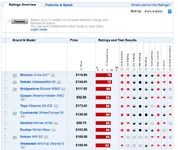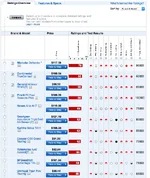You are using an out of date browser. It may not display this or other websites correctly.
You should upgrade or use an alternative browser.
You should upgrade or use an alternative browser.
Conti TrueContact on Sale, Canada
- Thread starter Rarebit
- Start date
Went to my local CT and the service guy wouldn't sell me the Continental True Contact because of it speed rating.
Ridiculous. The top speed of the CX-5 is lower than the H speed rating of the TrueContact. And CT had no compunction about selling the TrueContact to me and mounting them on my CX-5 wheels.
Ridiculous. The top speed of the CX-5 is lower than the H speed rating of the TrueContact. And CT had no compunction about selling the TrueContact to me and mounting them on my CX-5 wheels.
I'm in the lower mainland as well. Which CT did u go to buy?
I'm in the lower mainland as well. Which CT did u go to buy?
North Vancouver, 1350 Main Street, BC V7J 1C6.
These tires are incredible compared to the stock toyo's. Snow accelleration is close to a dedicated snow tire, braking, not as good as snow tire, but pretty good and can't imagine another all season being better. Drove in 6" of heavy snow today, then lightly dusted ice covered street (yes, other cars were sliding around). My CX5 was stable.
I saw in CR where they ranked the CX5 awd system last. I bet it was due to those crappy stock tires.
I saw in CR where they ranked the CX5 awd system last. I bet it was due to those crappy stock tires.
These tires are incredible compared to the stock toyo's. Snow accelleration is close to a dedicated snow tire, braking, not as good as snow tire, but pretty good and can't imagine another all season being better. Drove in 6" of heavy snow today, then lightly dusted ice covered street (yes, other cars were sliding around). My CX5 was stable.
I saw in CR where they ranked the CX5 awd system last. I bet it was due to those crappy stock tires.
While the stock tires don't help it in the snow it didn't actually rate last. Notice "Worst listed first". That honor would goto the Nissan Juke.

Even CR is missing a beat in its recommendations on snow tires vs. all season tires. It doesn't consider the braking disadvantage snow tires suffer from on dry and wet pavement.
For those whose winter conditions include continuous ice and snow - i.e. weeks of sub-freezing temperatures - snow tires are the only safe choice. Likewise, snow tires are the only choice for those venturing into snowy mountain passes or other snowy roads where loss of control could lead to a collision or sliding off the road into dangerous terrain.
But what about those who put snow tires on in late November, take them off in late March, and experience snow for a few weeks of weather that includes few constantly below freezing periods? We drive ~ 90% of our miles on wet or dry pavement - conditions in which snow tires perform significantly worse than all season tires. In my case, safety typically depends on two factors: 1) my ability to drive within the limits of the vehicle and road conditions; and 2) the ability of the tires to brake suddenly in traffic when something unexpected happens in front of me. I've driven for 50 years with no accidents, so I'm confident I'm not going to over-drive the conditions or the capabilities of the vehicle. But I need to be able to stop when someone in front of me screws up.
No doubt, venturing into the mountains with all season tires is risky. Not only might you get stuck, but worse, you might not be able to stop or remain on the road when the conditions get bad. I might encounter such conditions one or twice in a winter. The rest of the time, I rely on my braking to keep me safe, and with winter tires, it's not as good.
Top rated winter tires in CR - note the performance on snow, ice, dry and wet pavement.

Top rated all season tires in CR - note the performance on snow, ice, dry and wet pavement.

For those whose winter conditions include continuous ice and snow - i.e. weeks of sub-freezing temperatures - snow tires are the only safe choice. Likewise, snow tires are the only choice for those venturing into snowy mountain passes or other snowy roads where loss of control could lead to a collision or sliding off the road into dangerous terrain.
But what about those who put snow tires on in late November, take them off in late March, and experience snow for a few weeks of weather that includes few constantly below freezing periods? We drive ~ 90% of our miles on wet or dry pavement - conditions in which snow tires perform significantly worse than all season tires. In my case, safety typically depends on two factors: 1) my ability to drive within the limits of the vehicle and road conditions; and 2) the ability of the tires to brake suddenly in traffic when something unexpected happens in front of me. I've driven for 50 years with no accidents, so I'm confident I'm not going to over-drive the conditions or the capabilities of the vehicle. But I need to be able to stop when someone in front of me screws up.
No doubt, venturing into the mountains with all season tires is risky. Not only might you get stuck, but worse, you might not be able to stop or remain on the road when the conditions get bad. I might encounter such conditions one or twice in a winter. The rest of the time, I rely on my braking to keep me safe, and with winter tires, it's not as good.
Top rated winter tires in CR - note the performance on snow, ice, dry and wet pavement.

Top rated all season tires in CR - note the performance on snow, ice, dry and wet pavement.

Last edited:
Even CR is missing a beat in its recommendations on snow tires vs. all season tires. It doesn't consider the braking disadvantage snow tires suffer from on dry and wet pavement.
You have a HUGE misconception here. In colder winter temps many winter tires have BETTER (not worse) traction on dry and wet pavement. This is due to the softer rubber compound that retains more grip at lower temperatures. Information recently posted and discussed in this forum indicated the cross-over temperature is about 40-45 degrees F.
This matches my experience with many winter tires vs. all season radials.
My current winter tires, Goodyear IceGrip WRT's, have more dry and wet pavement traction than the OEM Geolanders at all temperatures below 50 degrees F. Substantially more. Enough to save a life. The additional performance of many winter tires do not require snow and ice to provide substantial benefits.
As to Consumer Reports, I wouldn't trust their editors over my own experience to tell me what works best in a winter storm.
Tire Rack now says that SOME all season tires use tread designs and rubber compounds that make them good performers in all seasons. Of course, there are compromises with any all season tire. They can't be "best" at everything/ But the TrueContacts are rated by both CR and Tire Rack as performing well in winter conditions. (Of course, I'm not claiming they perform as well as dedicated winter tires.) I think we'll have to see tire testing of all season and winter tires conducted at the same temperatures to know whether the all season tires of these new designs lose traction the way older all season designs did in colder conditions. The characteristics CR and Tire Rack use to describe the TrueContacts, and the reviews provided by some owners suggest they're a good compromise for the conditions I described above.
I drove on my TrueContacts in a near-freezing snowfall a few days ago, with approximately 2 inches of snow accumulated on the roads. I had no concerns about they way they handled the snow. If it snows more this winter I may get the chance to test them with deeper accumulations.
I drove on my TrueContacts in a near-freezing snowfall a few days ago, with approximately 2 inches of snow accumulated on the roads. I had no concerns about they way they handled the snow. If it snows more this winter I may get the chance to test them with deeper accumulations.
I drove on my TrueContacts in a near-freezing snowfall a few days ago, with approximately 2 inches of snow accumulated on the roads. I had no concerns about they way they handled the snow. If it snows more this winter I may get the chance to test them with deeper accumulations.
I have a set of the Conti's with "DWS" (dry, wet, snow) molded into the tread. They are very good all-around performers but nowhere near a dedicated winter tire on ice. It's generally not the depth of the snow that determines how challenging the conditions are but other factors like what type of snow it is and whether there is an ice layer underneath (and how the ice formed). The combinations are endless. But fresh, dry snow is one of the easiest conditions and many car/tire combinations can easily navigate through 6 inches of fresh snow. On the other hand, a layer of the right type of ice less than a mm thick and a small hill can leave many tire/vehicle combinations helpless.
New Posts and Comments
- Replies
- 16
- Views
- 2K
- Replies
- 56
- Views
- 9K
- Replies
- 13
- Views
- 1K
